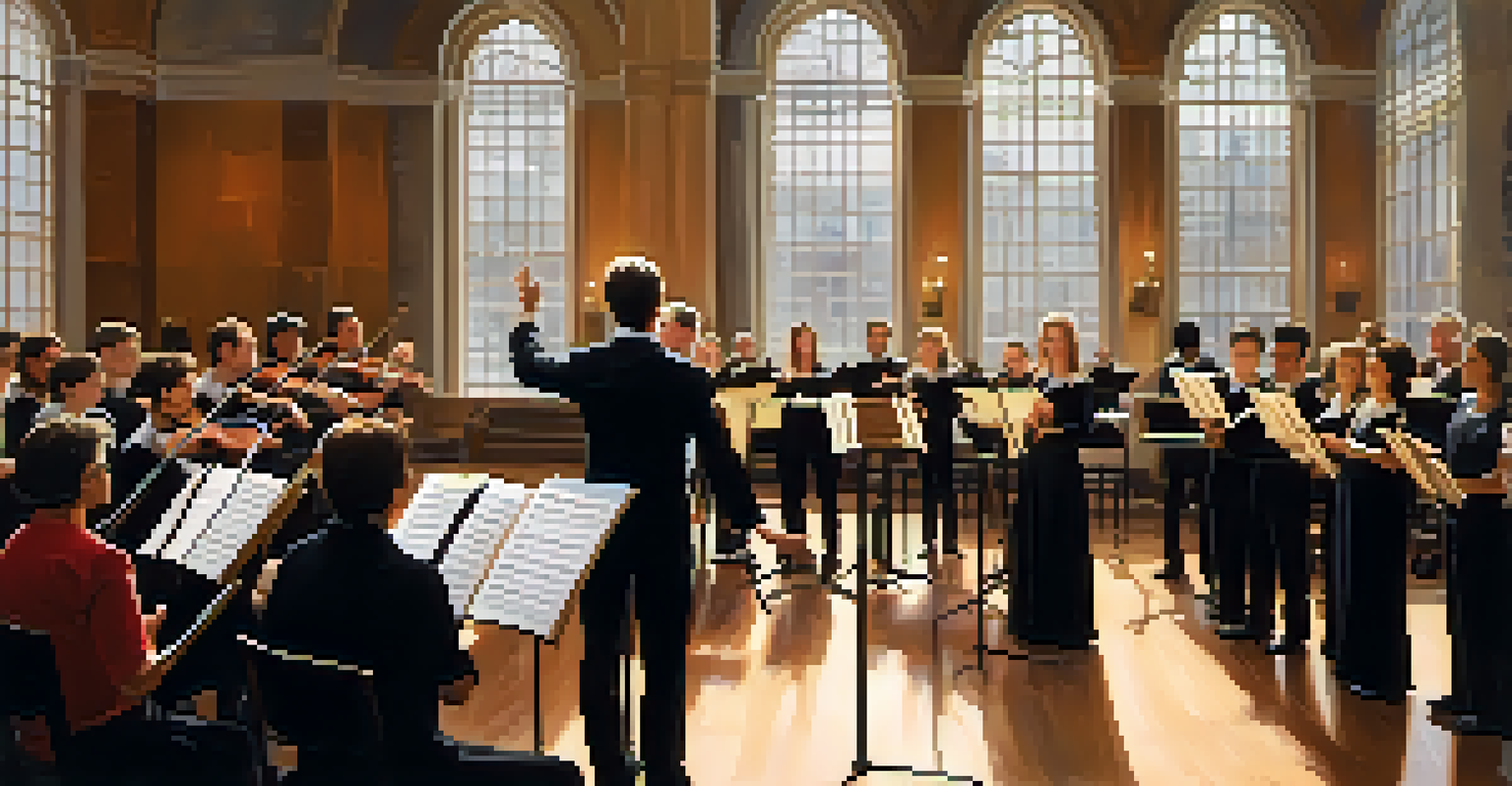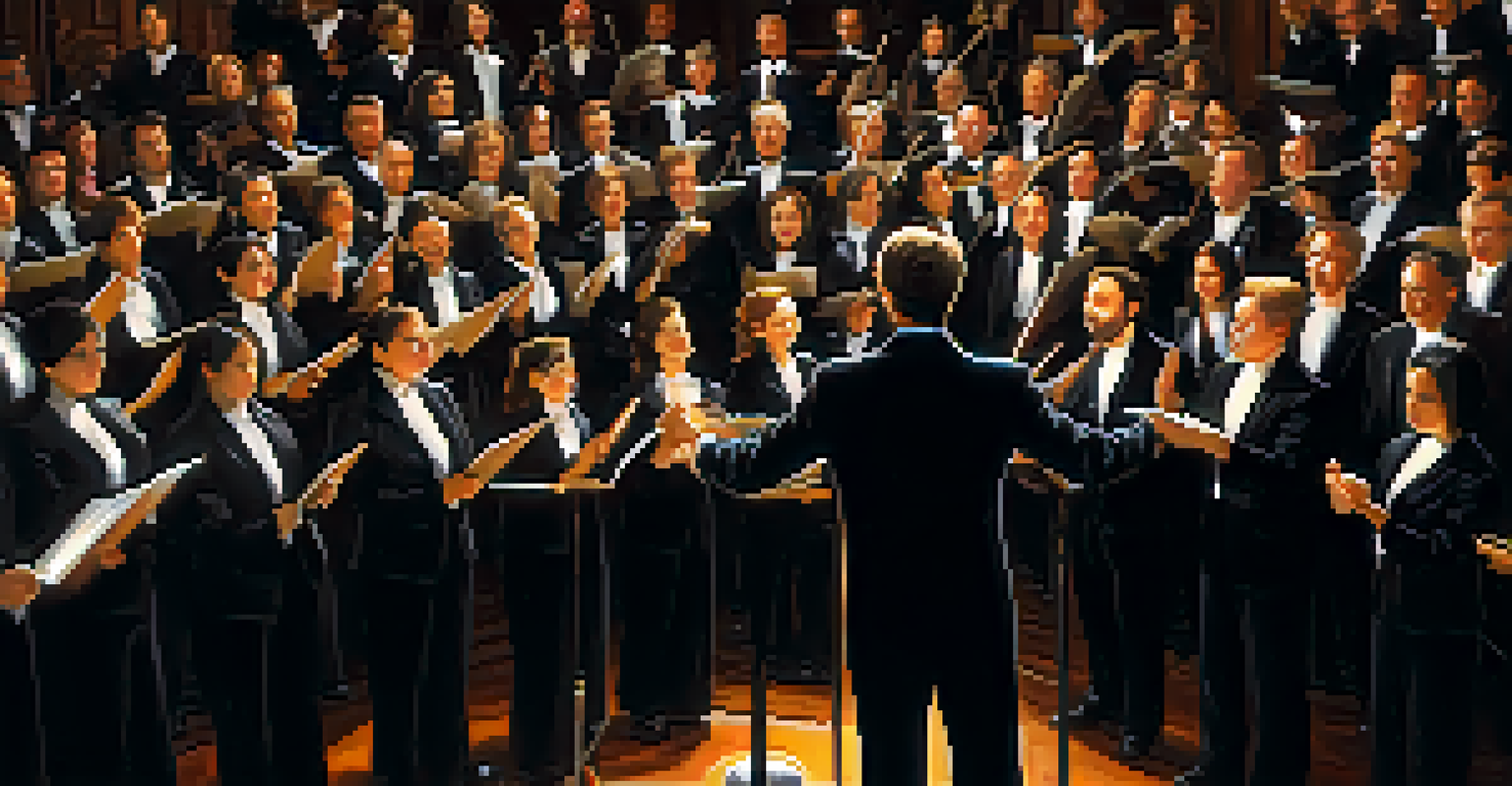The Role of the Conductor in Choral Music Performance

Understanding the Conductor's Leadership in Choirs
The conductor serves as the guiding force in a choral performance, leading the singers through complex musical pieces. Their role goes beyond waving a baton; it involves setting the tone, dynamics, and overall interpretation of the music. Just like a captain steering a ship, a conductor navigates the choir through the intricacies of harmony and rhythm.
To me, the conductor is the most important person in the performance. They are the ones who bring the music to life and connect the audience to the performers.
Effective leadership fosters a sense of unity among singers, allowing them to blend their voices harmoniously. The conductor's ability to communicate through gestures and facial expressions creates an environment where singers feel supported and inspired. This connection is vital, as it encourages individual singers to contribute to the collective sound.
Moreover, the conductor must possess a deep understanding of the music, enabling them to make informed artistic choices. They interpret the composer’s intentions while also considering the strengths and weaknesses of their choir. This blend of knowledge and intuition is what helps transform a simple rehearsal into a captivating performance.
Communication: The Conductor's Key to Successful Rehearsals
Communication is at the heart of effective choral conducting. A skilled conductor knows how to convey their vision clearly, ensuring that each member of the choir understands their role within the larger context. This involves not only verbal instructions but also non-verbal cues, such as hand signals and facial expressions.

During rehearsals, a conductor's ability to provide constructive feedback can significantly enhance the choir's performance. By identifying areas for improvement while also praising successes, conductors can boost morale and encourage a positive learning environment. Think of it like a coach guiding a sports team to victory, adjusting strategies as needed.
Conductor as a Guiding Force
The conductor leads the choir through intricate musical pieces, fostering unity and emotional connection among singers.
Additionally, a conductor must be attuned to the emotional nuances of the music. By expressing their passion and excitement, they motivate singers to invest their emotions into the performance. This emotional connection can lead to a more powerful and moving rendition of the piece, captivating both the performers and the audience.
The Conductor's Role in Musical Interpretation
One of the conductor's most important responsibilities is interpreting the music. This involves making artistic decisions about tempo, dynamics, and phrasing that shape how the choir presents a piece. Much like a painter chooses colors to express their vision, conductors use their interpretations to bring the music to life.
The conductor must be a master of communication, for it is through their voice and gestures that the singers find their way.
Through their interpretation, conductors can highlight the emotional depth of a piece, guiding the choir to evoke specific feelings. This artistic vision influences how the choir communicates with the audience, creating a memorable experience. For example, a slow, gentle interpretation can evoke a sense of nostalgia, while a lively tempo can inspire joy.
Interpreting music also requires a deep understanding of the historical context and style of the piece. A conductor must consider the composer’s intentions and the genre's characteristics, ensuring that the performance is authentic. This commitment to fidelity enriches the overall experience for both the choir and the audience.
Building a Cohesive Choir: The Conductor's Influence
A conductor plays a vital role in fostering a sense of community among choir members. By encouraging collaboration and teamwork, they create an environment where singers feel comfortable and valued. This camaraderie is essential for achieving a cohesive sound, as it allows individuals to blend their voices seamlessly.
Furthermore, a conductor's ability to recognize and nurture individual strengths within the choir can lead to a more dynamic performance. By assigning solos or highlighting particular sections, they enable singers to shine while still contributing to the overall harmony. It's much like a gardener tending to each plant to ensure a beautiful garden.
Effective Communication is Key
Clear communication and constructive feedback from the conductor enhance the choir's performance and morale during rehearsals.
As trust builds between the conductor and choir members, singers become more willing to take risks and explore new musical ideas. This creative freedom can lead to innovative interpretations and memorable performances. Ultimately, a strong bond within the choir contributes to a more polished and engaging presentation.
Technical Skills: The Conductor's Foundation
While leadership and communication are crucial, a conductor's technical skills form the foundation of their effectiveness. Mastery of musical theory, score reading, and vocal techniques allows conductors to guide their choirs with confidence. This technical expertise enables them to address challenges that may arise during rehearsals or performances.
Additionally, a conductor must be proficient in conducting techniques, such as beat patterns and cues, to ensure clear and precise guidance. This clarity helps singers stay synchronized and understand the conductor's intentions, much like a traffic signal directing vehicles at an intersection.
Continual learning and practice are essential for conductors to refine their skills. Attending workshops, studying various conducting styles, and seeking feedback from peers can enhance their effectiveness. This commitment to growth ultimately reflects in the quality of the choir's performance.
Emotional Connection: The Conductor's Impact on Performance
The emotional connection between a conductor and their choir can significantly influence a performance's impact. A conductor who is passionate about the music inspires singers to share that enthusiasm, resulting in a more engaging experience for the audience. Imagine a storyteller captivating listeners; the same principle applies to a conductor guiding their choir.
Moreover, a conductor's ability to convey the emotional essence of a piece helps singers connect with the music on a deeper level. This understanding allows them to express the intended feelings through their singing, creating a powerful atmosphere. The audience can feel this energy, making the performance memorable.
Emotional Connection Enhances Performance
A strong emotional bond between the conductor and choir significantly elevates the quality and impact of a performance.
Ultimately, the emotional bond cultivated by the conductor enhances the overall performance quality. When singers feel supported and inspired, they are more willing to take risks and explore the music's depths. This emotional investment transforms a good performance into an extraordinary one.
The Conductor's Role in Performance Preparation
Preparing for a performance is a multifaceted process, and the conductor is at the helm of this journey. From selecting repertoire to scheduling rehearsals, conductors ensure that every detail is meticulously planned. This proactive approach sets the stage for a successful performance that showcases the choir's talents.
Conductors also play a crucial role in creating a performance atmosphere that promotes focus and confidence. This includes managing logistics, such as stage setup and sound checks, to ensure that everything runs smoothly on the day of the performance. Think of it as an event planner curating an unforgettable experience.

On performance day, a conductor's presence can help calm nerves and encourage singers to give their best. By offering words of encouragement and reminding them of their hard work, conductors instill confidence in their choir. This supportive environment often leads to a spirited and memorable performance for both the singers and the audience.